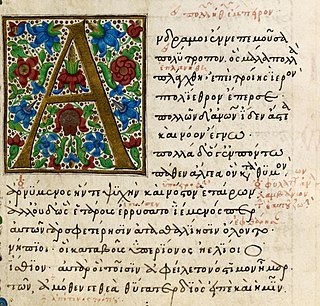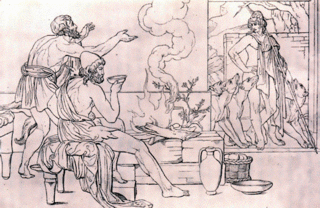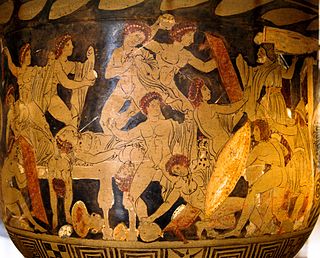
The Odyssey is one of two major ancient Greek epic poems attributed to Homer. It is one of the oldest works of literature still widely read by modern audiences. Like the Iliad, the Odyssey is divided into 24 books. It follows the Greek hero Odysseus, king of Ithaca, and his journey home after the Trojan War. After the war, which lasted ten years, his journey from Troy to Ithaca, via Africa and southern Europe, lasted for ten additional years during which time he encountered many perils and all of his crewmates were killed. In his absence, Odysseus was assumed dead, and his wife Penelope and son Telemachus had to contend with a group of unruly suitors who were competing for Penelope's hand in marriage.

Penelope is a character in Homer's Odyssey. She was the queen of Ithaca and was the daughter of Spartan king Icarius and Asterodia. Penelope is known for her fidelity to her husband Odysseus, despite the attention of more than a hundred suitors during his absence. In one source, Penelope's original name was Arnacia or Arnaea.

In Greek mythology, Telemachus is the son of Odysseus and Penelope, who are central characters in Homer's Odyssey. When Telemachus reached manhood, he visited Pylos and Sparta in search of his wandering father. On his return to Ithaca, he found that Odysseus had reached home before him. Then father and son slew the suitors who had gathered around Penelope. According to later tradition, Telemachus married Circe after Odysseus's death.
In Greek mythology, Eteoneus may refer to various characters:

In Greek mythology, Eumaeus was Odysseus' slave, swineherd, and friend. His father, Ctesius, son of Ormenus, was king of an island called Syra, although it has also been suggested that Eumaeus may have referred to Syracuse, Sicily.
In Greek mythology, Polypoetes was a name attributed to the following individuals:

In Homer's Odyssey, Argos, sometimes referred to as Argus, is Odysseus's faithful dog. Bred to be a hunting dog before Odysseus leaves for the Trojan War, Argos is neglected after Odysseus is presumed dead. Twenty years later, Odysseus returns to Ithaca and finds him lying in piles of manure, immobile from old age and neglect, and infested with parasites. When Argos sees Odysseus, he immediately drops his ears, wags his tail and recognizes him. Disguised as a beggar, Odysseus cannot greet his dog without revealing his identity, but secretly weeps. Upon seeing his master return home, Argos dies.

The Odyssey is a 1997 American mythology–adventure television miniseries based on the ancient Greek epic poem by Homer, the Odyssey. Directed by Andrei Konchalovsky and co-produced by Hallmark Entertainment and American Zoetrope, the miniseries aired in two parts beginning on May 18, 1997, on NBC. It was filmed in Malta, Turkey, parts of England and many other places around the Mediterranean, where the story takes place. The cast includes Armand Assante, Greta Scacchi, Irene Papas, Isabella Rossellini, Bernadette Peters, Eric Roberts, Geraldine Chaplin, Jeroen Krabbé, Christopher Lee and Vanessa Williams.
In Greek mythology, Pylaemenes may refer to two distinct characters:

Philoetius is a character in Greek mythology who plays a significant role in Homer's Odyssey, aiding Odysseus, Telemachus, and Eumaeus in their slaughter of the suitors of Penelope.
In Greek mythology, Amphimachus was a name attributed to multiple individuals.

In Greek mythology, the suitors of Penelope are one of the main subjects of Homer's Odyssey.
In Greek mythology, more precisely in the epic tradition recounted in Homer's Odyssey, Dolius or Dolios was a slave of Penelope whom she had received from her father Icarius on occasion of her marriage to Odysseus. He served as a gardener.
In Greek mythology, the name Ctesippus may refer to:
In Greek mythology, the name Damastor may refer to:
In Greek mythology, Halius may refer to the following characters:
In Greek mythology, Melantho is one of the minor characters in the Odyssey.
In Greek mythology, Ctesius may refer to three distinct characters:
In Greek mythology, Ithacus may refer to two different characters:

The Return is a 2024 drama film directed by Uberto Pasolini and starring Ralph Fiennes and Juliette Binoche. The film is a retelling of the last sections of Homer's Odyssey as adapted by Edward Bond, John Collee, and Pasolini.








